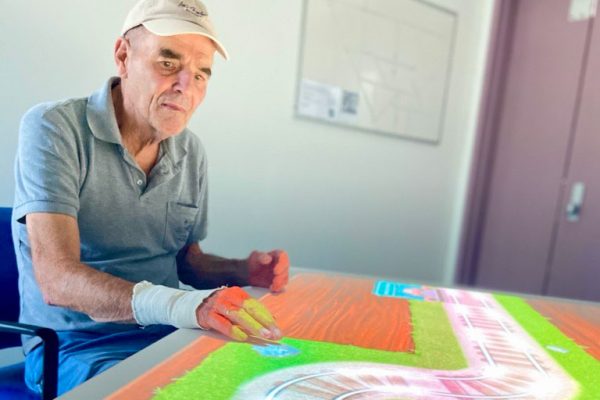Magic table improving care for older patients

Patient Robert enjoying the interactive ToverTafel table in the Cognitive Assessment and Management (CAM) Unit at The Prince Charles Hospital.
The new “magic” table at The Prince Charles Hospital (TPCH) is harnessing the power of AI to reduce stress and the need for medication for older patients experiencing change behaviours associated with cognitive impairment.
The ToverTafel AI system, which means magic table in Dutch, was installed in the TPCH Cognitive Assessment and Management (CAM) Unit. The unit provides highly specialised care for individuals diagnosed with cognitive impairment with severe changed behaviours who are unable to be managed at home or in a residential aged care facility.
TPCH is the first hospital in Australia to install a ToverTafel table, which features a range of scientifically-backed interactive games for patients to engage with, helping to reduce agitation, increase joy and meaningful distraction, and reduce medication that can have side effects and cause harm such as falls.
Not only does the table reduce restless and tense behaviour, it also increases physical activity, promotes social interaction and improves relationships between patients, carers, family and staff.
TPCH CAM Unit Nurse Unit Manager Vijay Pillai said the table has been highly effective in addressing one of the main challenges of the unit, which is engaging patients with diversional therapy.
“Most challenging behaviours for patients arise from their inability to regulate stress, unmet needs and boredom. Diversional therapy engagement is a way to encourage individuals to engage in meaningful activities that allow them to reminisce on their past,” Vijay said.
“Our patients were in awe the first time they saw the ToverTafel table, and very inquisitive.
“The games have been very appealing to their cognition as they try to make sense of how images are moving on the table as they interact.
“So far have been holding one session every morning and afternoon and have seen less aberrant motor agitation as a result of the table. We’ve even used it on a night shift to calm down a patient, with great success.
“We will soon conduct a comparative study to determine the success of the table.”
